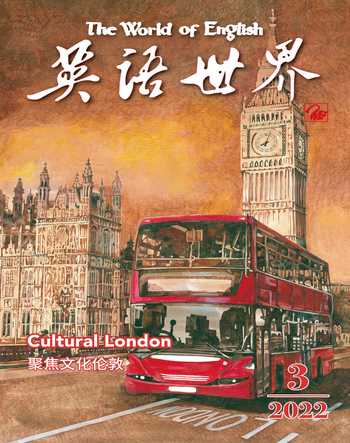Portrait of a Londoner (Excerpt)《伦敦人》(节选)
2022-03-22弗吉尼亚·伍尔夫乔修峰
弗吉尼亚·伍尔夫 乔修峰
Nobody can be said to know London who does not know one true Cockney—who cannot turn down a side street, away from the shops and the theatres, and knock at a private door in a street of private houses.
Private houses in London are apt to be much of a muchness. The door opens on a dark hall; from the dark hall rises a narrow staircase; off the landing opens a double drawing-room, and in this double drawing-room are two sofas on each side of a blazing fire, six armchairs, and three long windows giving upon the street. What happens in the back half of the drawing-room which looks upon the gardens of other houses is often a matter of considerable conjecture. But it is with the front drawing-room that we are here concerned; for Mrs Crowe always sat there in an armchair by the fire; it was there that she had her being; it was there that she poured out tea…
There by the fire in winter, by the window in summer, she had sat for sixty years—but not alone. There was always someone in the armchair opposite, paying a call. And before the first caller had been seated ten minutes the door always opened, and the maid Maria, she of the prominent eyes and prominent teeth, who had opened the door for sixty years, opened it once more and announced a second visitor; and then a third, and then a fourth.
A tête-à-tête with Mrs Crowe was unknown. She disliked tête-à-têtes. It was part of a peculiarity that she shared with many hostesses that she was never specially intimate with anyone. For example, there was always an elderly man in the corner by the cabinet—who seemed, indeed, as much a part of that admirable piece of eighteenth-century furniture as its own brass claws. But he was always addressed as Mr Graham—never John, never William: though sometimes she would call him ‘dear Mr Graham as if to mark the fact that she had known him for sixty years.
The truth was she did not want intimacy; she wanted conversation. Intimacy has a way of breeding silence, and silence she abhorred. There must be talk, and it must be general, and it must be about everything. It must not go too deep, and it must not be too clever, for if it went too far in either of these directions somebody was sure to feel out of it, and to sit balancing his tea-cup, saying nothing.
Thus Mrs Crowes drawing-room had little in common with the celebrated salons of the memoir writers. Clever people often came there—judges, doctors, members of parliament, writers, musicians, people who travelled, people who played polo, actors and complete nonentities, but if anyone said a brilliant thing it was felt to be rather a breach of etiquette—an accident that one ignored, like a fit of sneezing, or some catastrophe with a muffin. The talk that Mrs Crowe liked and inspired was a glorified version of village gossip. The village was London, and the gossip was about London life. But Mrs Crowes great gift consisted in making the vast metropolis seem as small as a village with one church, one manor house and twenty-five cottages. She had first-hand information about every play, every picture show, every trial, every divorce case. She knew who was marrying, who was dying, who was in town and who was out. She would mention the fact that she had just seen Lady Umphlebys car go by, and hazard a guess that she was going to visit her daughter whose baby had been born last night, just as a village woman speaks of the Squires lady driving to the station to meet Mr John, who is expected down from town…
Thus, to know London not merely as a gorgeous spectacle, a mart, a court, a hive of industry, but as a place where people meet and talk, laugh, marry, and die, paint, write and act, rule and legislate, it was essential to know Mrs Crowe. It was in her drawing-room that the innumerable fragments of the vast metropolis seemed to come together into one lively, comprehensible, amusing and agreeable whole. Travellers absent for years, battered and sun-dried men just landed from India or Africa, from remote travels and adventures among savages and tigers, would come straight to the little house in the quiet street to be taken back into the heart of civilisation at one stride. But even London itself could not keep Mrs Crowe alive for ever. It is a fact that one day Mrs Crowe was not sitting in the armchair by the fire as the clock struck five; Maria did not open the door; Mr Graham had detached himself from the cabinet. Mrs Crowe is dead, and London—no, though London still exists, London will never be the same city again.
要是連一个土生土长的伦敦人都不认识,不能拐进一条远离商铺和剧院的小巷,在一条私宅林立的小街上叩开一扇门,那就算不上真正了解伦敦。
伦敦的私人住宅基本大同小异。一进门,映入眼帘的就是昏暗的门厅。门厅尽头,是狭窄的楼梯。走出楼梯平台,就是一个分成前后间的大客厅,客厅里有一个壁炉,炉子里的火烧得很旺,壁炉两边各有两张沙发,此外还有六把扶手椅,三扇长窗正对着街道。客厅后半间望出去是别人家的花园,这半间会发生什么故事,常常让人浮想联翩。不过,我们现在说的是前半间,因为克罗夫人总是坐在这边炉旁的扶手椅上。在这里,她有存在感;在这里,她斟茶品茗……
冬日的炉边,夏日的窗前,她一坐就是六十年——但不是只身一人。总有人来拜访,就坐在对面的扶手椅上。常常是第一个客人坐下还不到十分钟,门便又开了——是那个鼓睛暴眼、牙齿外突的女仆玛丽亚再次打开的门,通报第二个访客的到来,然后是第三个、第四个。这差事,玛丽亚已经干了六十年。
克罗夫人从不跟人私密交谈。她不喜欢私密交谈。她和很多女主人一样,都有一种怪癖,就是从不跟任何人过分亲密。比如说,有位老先生总是靠在角落那个十八世纪的精美储藏柜边,看上去就跟柜子的铜脚一样,也成了柜子的一部分。但他总是被叫作格雷厄姆先生——从来没有被叫作约翰,或者威廉。不过,有时候她也会叫他“亲爱的格雷厄姆先生”,似乎是为了表明他们确实相识了六十年。
事实是她不想跟人太亲密,她只是想找人聊天。太亲密就容易陷入沉默,她讨厌沉默。必须得聊起来,话题必须笼统,还必须得无所不包。不能太深入,也不能太深奥,不然肯定会有人觉得插不上话,只能坐在那里摆弄自己的茶杯,一言不发。
所以,克罗夫人的客厅跟那些传记作家的高雅沙龙大不相同。来客厅的通常都是聪明人——法官、医生、议员、作家、音乐家、旅行的、打马球的、演员,还有彻头彻尾的无名之辈。不过,谁要是说了件有趣的事,就会被认作坏了规矩,人们会装作没听见,就像有人打了个喷嚏,或者吃松糕噎着了。克罗夫人喜欢并发起的那种交谈,是一种体面的乡村闲话。这个乡村就是伦敦,闲话说的也是伦敦的生活。克罗夫人的拿手绝活就是把一座大都市变成一个看似只有一座教堂、一处庄园、二十五间茅舍的小村庄。每一出戏、每一次画展、每一场官司、每一桩离婚,她都有第一手信息。谁要结婚了、谁要死了、谁在城里,谁不在城里,她全知道。她会告诉你,她刚看见昂弗尔比夫人的车开过去了,估计是去看女儿,昂弗尔比夫人的女儿昨晚刚生了孩子——她说话时那神态,就像村里的妇人说起地主太太开车去车站接城里来的约翰先生……
因此,要想了解伦敦不只是一处奇观、一个购物天堂、一处宫廷重地、一个工业中心,还是人们聚会、聊天、欢笑、结婚、死亡、画画、写作、演出、统治、立法的地方,那就一定要认识克罗夫人。正是在她的客厅里,这座大都市的无数碎片似乎汇聚成了一个活泼、易懂、有趣、可爱的整体。那些长年漂泊在外、经受风吹日晒的人,刚从印度或非洲回国,刚从野人和老虎出没的远方历险归来,会径直来到这条安静的街道,一踏进这栋小房子,便被带回到文明的中心。可是,就算是伦敦,也没法让克罗夫人永生。谁都知道,总有一天,五点的钟声敲响的时候,克罗夫人不再坐在炉边的扶手椅上,玛丽亚也不再去开门,格雷厄姆先生也不再靠在储藏柜边。克罗夫人走了,伦敦也——唉,伦敦尽管还在,但再也不会是从前那个伦敦了。
